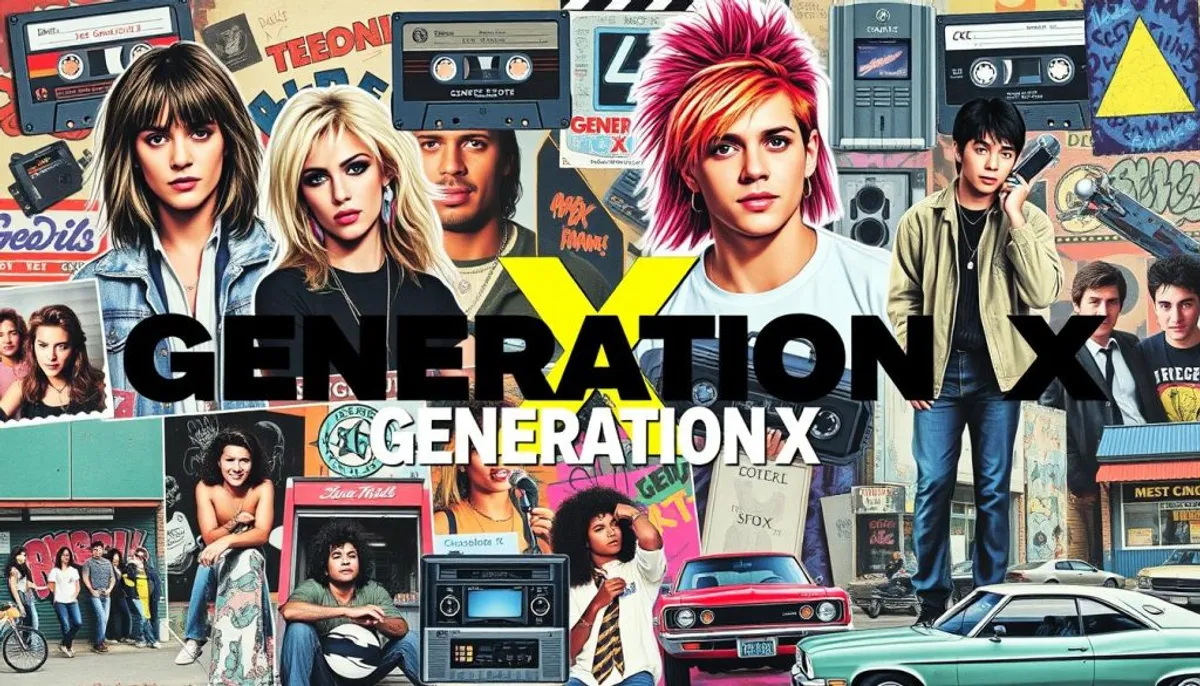The Generation X, born between 1965 and 1976, has shaped a unique culture within Western society. This age group, situated between the baby boomers and Generation Y, has developed a distinctive lifestyle and values.
Marked by economic and social changes, Generation X has faced numerous challenges. The context of globalization and social decline has heavily influenced their professional and personal journeys.

The X culture is characterized by a pragmatic attitude towards the difficulties of the job market. This generation has had to adapt to a constantly evolving economic environment, which has forged their resilience and adaptability.
The values of Generation X often reflect a mix of cynicism and independence. Their unique experiences have led them to question traditional institutions while seeking to create their own path in Western society.
Origins and Definition of Generation X
Generation X, born between 1966 and 1976, covers a period from 1961 to 1980. This cohort emerged in a complex socio-economic context, marked by the challenges of the 80s and 90s, as well as by the interaction of nature and culture.
A Generation Born Between 1965 and 1976
Today, members of Generation X are between 44 and 62 years old. They have gone through periods of financial crisis and oil shocks. This generation experienced a baby bust, with a birth rate lower than that of their parents.
The Emergence of the Term "Generation X"
The term "Generation X" was popularized by Douglas Coupland in his eponymous novel. It describes a generation seen as different and unknown, searching for its place in a rapidly changing world.

The Historical and Social Context
Generation X grew up in a world marked by the end of the Cold War and the independence of African countries. They witnessed the early steps of space exploration and the emergence of new environmental concerns. Professionally, this generation prioritizes personal fulfillment, collaboration, and work-life balance.
| Characteristics | Generation X |
|---|---|
| Birth Period | 1961-1980 |
| Economic Context | Crises, oil shocks |
| Professional Values | Fulfillment, collaboration |
| Significant Events | End of the Cold War, space exploration |
The X Culture: Identity and Distinctive Characteristics
Generation X is distinguished by a unique identity, shaped by its social and cultural context. Born between 1965 and 1976, it has developed distinct values and ways of thinking. These set it apart from previous and subsequent generations. In this context, Val-d'Or shows play an important role in reflecting the values and aspirations of this generation.
Values and Ways of Thinking
Cynicism is a hallmark of Generation X. This attitude manifests itself through a questioning of traditional values. It is also marked by a distrust of established institutions. The identity of this generation is complex, influenced by various cultural and social factors.
Relationship with Society and Institutions
Generation X maintains an ambivalent relationship with society. It tends towards counter-culture, often rejecting established norms. This attitude is reflected in their varied life choices and their critical approach to traditional socialization. Their identity is built through personal reflection and self-awareness influenced by their cultural environment, notably through initiatives like artistic crowdfunding.
Influence of Media and Music
MTV played a crucial role in shaping the identity of Generation X. The channel exposed this generation to a variety of musical styles, including alternative music. The latter became emblematic of their culture. Social media, while less present at the time, began to influence identity construction, particularly through cultural consumption on platforms like Facebook.
- Alternative music has shaped the cultural expression of Generation X
- MTV served as the main vehicle for disseminating this musical culture
- Social networks emerged as a new tool for identity expression
The X culture is thus characterized by a distinct identity. It is marked by cynicism, counter-culture, and a strong influence from media and alternative music. This generation has managed to carve its own path, questioning norms while forging new forms of cultural expression.
Socio-Economic Context and Professional Impact
Generation X has navigated through unprecedented challenges in the job market. Born in the midst of profound economic changes, it has had to adapt to a constantly evolving professional environment. This dynamic has influenced their perception of employment and their adaptability.
The "Trough of the Wave" Generation
Referred to as the "sacrificed generation," Generation X has experienced increased precarity. A 2013 survey revealed that 10% of employees have faced toxic work situations, impacting their psychological well-being.
The Challenges of the Job Market
Members of this generation have had to confront an unstable job market. Financialization and globalization have transformed working conditions. An analysis showed that the organization of work and the financialization of companies have greatly influenced employees' sense of work.

Adaptation to Economic Changes
In the face of these challenges, Generation X has developed a remarkable capacity for adaptation. The study identified four key conditions influencing the meaning of work: usefulness, autonomy, time pressure, and work relationships. These factors have varied according to the establishment's position in the value chain, demonstrating the complexity of the economic changes that this generation has had to adapt to.
| Aspect | Impact on Generation X |
|---|---|
| Job Precarity | 10% of employees in toxic situations |
| Influence of Financialization | Significant impact on the meaning of work |
| Conditions Affecting Work | Usefulness, autonomy, time pressure, relationships |
| Capacity for Adaptation | Strong, in the face of economic changes |
Cultural and Artistic Expression
Generation X has left a profound cultural imprint. Music and media have been essential in shaping its identity. This generation has expressed its individualism through various forms of art.
The Influence of MTV and Alternative Music
MTV transformed music consumption. It popularized genres like new wave and punk. Bands like Nirvana emerged, embodying the aspirations of their generation and enriching the cinematic culture of the time.
The Grunge Movement as a Generational Symbol
Grunge became a symbol of Generation X. Nirvana, at the forefront of this movement, captured the essence of this disillusioned youth. Their music reflected the frustration and alienation of many young people.
Counter-Culture and Its Manifestations
The counter-X culture expressed itself through various mediums. Art, literature, and cinema reflected a rejection of established values. This expression has influenced the artistic education of future generations.
| Field | Impact on Education | Key Figures |
|---|---|---|
| Music | Practice encouraged from kindergarten | 75% of students participate in artistic activities |
| Film | "School and Cinema," "Middle School at the Movies" programs | Millions of students reached over the past 20 years |
| Visual Arts | Specialized Arts teaching in high school | 7 artistic fields offered |
The cultural legacy of Generation X continues to influence artistic education. Today, 3 out of 4 students participate in artistic education activities. This demonstrates the importance placed on creative expression in French education.
Intergenerational Relationships
Generation X, born between 1965 and 1980, finds itself at the heart of a unique generational conflict. It is positioned between the baby boomers and Generation Y, which imposes specific challenges in the workplace and society. This intermediate position has forged a distinct identity, marked by pragmatism and adaptability.
In the professional context, intergenerational cohabitation is evolving. Companies emphasize equity, diversity, and inclusion. The valorization of seniority gives way to recognition of skills, regardless of generation. This social transition challenges age-related stereotypes, particularly regarding the use of digital tools by seniors.
Intergenerational relationships play a crucial role in the transmission of knowledge and values. They foster mutual understanding and strengthen family and social bonds. Shared activities, such as family cooking or cultural outings, create enriching moments of sharing. This approach contributes to building a more harmonious and inclusive society, where each generation adds its stone to the edifice.
RelatedRelated articles


